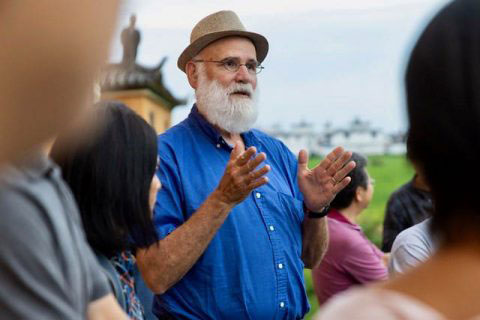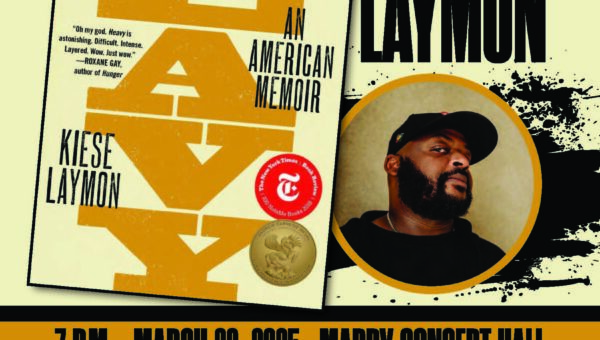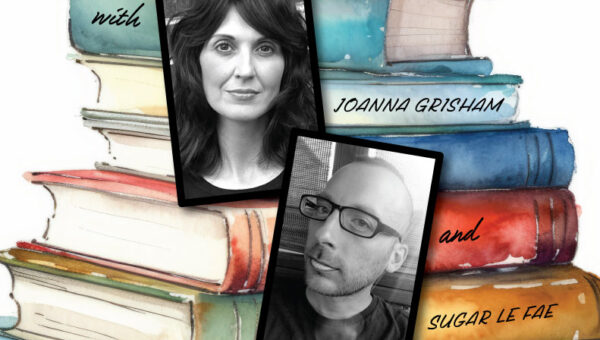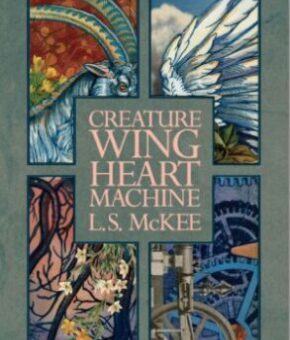On a May afternoon in 2013, Barry Kitterman stood inside the Mable Larson Gallery of the Harned Building, celebrating the end of the semester with colleagues and students. He still wore his black academic robe from the commencement ceremony earlier that day, and recent graduates kept tapping him on the shoulder to thank him for his guidance over the years. Glasses of punch were passed around, and trays of cookies and other treats were placed on nearby tables.
But just as Kitterman was allowing himself to relax at the end of a long semester, he felt someone urgently pulling his elbow. A former student—someone who’d graduated three years earlier—needed his help.
“I’d submitted a short story to a literary journal, and they’d emailed me, saying the story needed work before they could publish it,” Charles Booth said. In 2010, Kitterman served as Booth’s thesis advisor. “Barry knows more about stories—the mechanics of a good story—than anyone I know. He sat with me in his office, going over the story line by line with a pencil, while we heard people laughing and celebrating a floor below us.”
Booth sent his story, with Kitterman’s edits, to the magazine that afternoon, and a week later, The Southampton Review announced they would publish it in the fall issue.
“He acted like it was no big deal,” Booth said. “He seemed unbothered that I was selfishly taking him from a party and asking him to be a professor and mentor for one more hour.”
Booth’s experience is a story that has been repeated in the narrow hallways of Harned Hall since Kitterman first arrived at Austin Peay State University in 1995 to teach creative writing.
From the San Joaquin
Kitterman, an award-winning fiction writer, sometimes resembles a literary character because he’s spent the last 40 years blurring the line between his life and his art. He grew up in the small town of Ivanhoe, California, within that state’s large San Joaquin Valley—a sort of Steinbeck-type land of migrant workers and rabbit farms.
“When I would tell people I was from California, they had a certain set of assumptions as to what that meant,” Kitterman said in a 2011 interview. “It was so far removed from my real experience that I thought I wanted to write stories about the California I grew up in, which is rural, agricultural, a long way from the ocean and, something I realized much later, very poor.”
But Kitterman, like one of his characters, eventually left the small town to experience that other, more famous California. In his short story, “Billy Graham Saved My Life,” an Ivanhoe high school senior and choir member heads to the International Kiwanis Convention in San Francisco with dreams of attending The University of California at Berkeley.
“I’d been away from home a few times, but I’d never stayed overnight in a hotel,” the narrator says. “And from San Francisco we’d be able to look across the bay and see Berkeley.”
Like this young character, Kitterman enrolled at UC Berkeley, where he earned his artium baccalaureus (Bachelor of Arts) in English. Shortly after graduating, he joined the Peace Corps and spent two years in Belize. That experience would later inform his 2008 novel, The Baker’s Boy, which tells the story of Tanner Johnson and his disillusionment during time as a Peace Corps volunteer in Belize.
“In reading Barry Kitterman, I find myself rediscovering the pleasures of reading Dostoyevsky—admittedly an extravagant claim in response to a first novel,” Ann Neelon, a poet and Murray State University professor wrote in a review of the book. “Like Crime and Punishment, The Brothers Karamazov, The Idiot and/or The Possessed, The Baker’s Boy constitutes a powerful work of moral imagination.”
‘Call it a better life
When Kitterman returned from Belize, he enrolled in the MFA program at the University of Montana—one of the top writing programs in the country. That’s where he studied under luminaries like the acclaimed American writer William Kittredge.
“What I wanted, moving out to Montana, was a different life, call it a better life,” the narrator of Kitterman’s story, “Union Wages,” said.
While a graduate student in Montana, Kitterman started writing and publishing stories set in his hometown of Ivanhoe. In the years following his 1981 graduation, he’d come back to this project, eventually publishing the story collection, From the San Joaquin in 2011.
The late William Gay, best-selling author of Provinces of Night, described the stories as “deeply human” and “touched with grace and compassion and a strong sense of place.”
While at Montana, Kitterman also made another life-altering decision—he decided to talk to an intelligent young student named Jill Eichhorn. The two began dating, and they soon found that in addition to sharing a love of literature, the couple suffered from a strong sense of wanderlust. They wanted to see more of the world. After earning their degrees, the two married and then, in 1985, Kitterman and Eichhorn set off for the People’s Republic of China. That’s where they taught at Nankai University and Qingdao University, along with a children’s school in Taiwan. In 1988, they returned to the U.S., so Eichhorn could enroll in a doctoral English program at Miami University in Ohio.
Kitterman also taught writing classes at the school, and in 1989, he traveled to Massachusetts as the Hudson Walker fellow at the Fine Arts Work Center in Provincetown. Throughout this time, he continued writing fiction, publishing his work in literary journals like The Carolina Quarterly, The Chariton Review, Turnstile, Flyway and elsewhere.
‘Kindness and thoughtfulness’
In 1995, Kitterman arrived at Austin Peay as an assistant professor of creative writing. A few years later, Eichhorn joined him in the Department of Languages and Literature as an assistant professor and, later, director of Women’s Studies. While at Austin Peay, Kitterman’s literary career continued to flourish. He served as the fiction editor for the University’s Zone 3 Magazine and as an associate editor of The Green Hills Literary Lantern (Truman State University). He received a Tennessee Arts Commission Individual Artist (literary) Fellowship and a prestigious Creative Writing Fellowship in fiction from the National Endowment of the Arts. His 2008 novel, The Baker’s Boy, won the Maria Thomas Peace Corps Writers Award for Fiction.
But in addition to being a gifted writer, he discovered his gift of mentoring and encouraging his students. The young men and women in his classes often thought of him as something more than a professor.
“As an undergrad, he encouraged me to write, then he encouraged me to pursue an MA and an MFA,” Joey Grisham, writer and APSU instructor, said. “He has always been honest with me about my writing, and he pushes me to do more and to take work in new directions.”
Grisham continues to see Kitterman regularly as part of a local writing group that meets once a month. But their friendship goes beyond simple writing advice.
“My favorite memory of Barry is seeing his smiling face on my wedding day,” she said.
“Jenny and I were thrilled when he agreed to perform our marriage ceremony. He was with Jenny while we waited for the ceremony to begin; his calming presence eased her anxiety. The ceremony was perfect. And when it was over, our friend Katie said she wanted to go back in time and have Barry officiate her wedding too (she was pretty drunk, but she meant it). Everything Barry does, he does with kindness and thoughtfulness,” Grisham added. “He cares, and it’s obvious. I’m forever thankful for Barry’s mentorship and friendship over the years.”
In addition to being a mentor and professor, the character in this story of Barry Kitterman is also a supportive colleague, counselor (through his work as the University’s Ombudsman) and intense racquetball opponent.
When essayist and poet Dr. Amy Wright joined the University’s faculty in the early 2000s, Kitterman was assigned as her departmental mentor. He quickly showed her that Austin Peay’s creative writing program extended its reach beyond the campus borders.
“What I have always appreciated about teaching with Barry is his service to our students and local community,” Wright said. “We’ve marched together down College Street in honor of Dr. King. He founded Zone 3 Press with our first poetry book, Oval, by professor emeritus David Till. He organized for over 25 years the beloved annual event Bread & Words, which showcases student writers and gathers community to benefit area food pantries.
“When I think of Barry, the image often comes to mind of him serving as an all-inviting master of ceremonies—gesturing with one hand toward the band providing musical accompaniment and the other to the row of tables filled with crock pots of soup and loaves of bread to join us in thanks for creative words.”
In May 2021, this “master of ceremonies” will retire from a university that so many former students love and remember fondly simply because of their time with him. But even though he won’t be on campus as often as he was, for those who know him, he’ll “never leave.”
Those words close a poem Kitterman wrote in 2014 when his friend, President Tim Hall, left the University. That poem, “Some Come Back to This Place,” now applies to the writer himself.
Some Come Back to This Place
If you only remember one day, then let it be
the day you walked in rain to a class you would
have avoided, a morning water ran so deep
in the street the birds deserted their usual place
on the sidewalk. You made your way against the wind,
saluting the green man, one last glance at the clock
above Browning, wishing you were late enough
to give up and to give in,
to join the birds under the coffee shop awning.
Instead you went to class, feet swimming in
a thin pair of shoes (the first wrong choice of the day),
your book bag somehow heavier than when you left
your safe, dry room. At the white board, the professor
found the only smile she owned on this
recalcitrant day, her smile like an artifact
from a long forgotten archaeological dig.
When you think of this day, remember how she looked
at you, time-honored foe and would-be friend,
those professorial glasses fogging up
like your own, as if to say, Haven’t we
been in this together all along?
And something else, words like these . . . The music
of this age … the caddis nymph … the long sought
integer … will stay with you an hour
or a week, half a lifetime, will come to you
on sleepless nights when the baby cries, on days
of traffic stops and job interviews, quiet
moments in forest or in pew. Remember
then, and know you are remembered, the way
some come back to this place. Some never leave.
—Barry Kitterman





